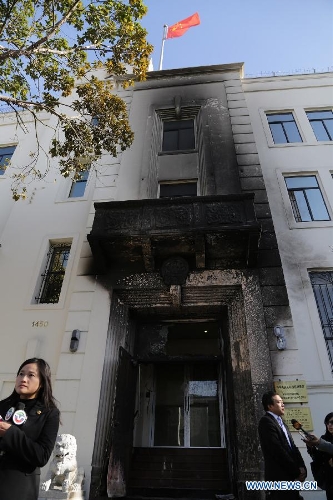HOME >> OP-ED
SF consulate arson is US security failure
Source:Global Times Published: 2014-1-3 0:18:01

A reporter (L) stands by the front gate of the Chinese Consulate-General in San Francisco, the United States, on Jan. 2, 2014. The United States is "deeply concerned" by reports that the Chinese Consulate-General in San Francisco was damaged in an arson attack, the State Department said Thursday. (Xinhua/Liu Yilin)
This is not the first time that the city's Chinese consulate was attacked. Tibetan separatists once set fire to the premises right before the Beijing Olympic Games, and its walls were also sabotaged by oil paint. Given the recurrence of such incidents, the US government can hardly absolve itself from blame.
There is a question that remains unsolved: Why has the Chinese consulate become an easy target in the face of the strongest US security forces?
China should put a query to the US, asking its authorities whether they, which boast the rule of law, have taken responsibility, through crackdowns on those offenders, of sending a clear signal that their crimes are "unforgivable."
China and its government are frequent headline-grabbers in the US mainstream media. Emotionally backed by US public opinion, anti-China forces are even funded by the US government and some social communities. With such support, they are more audacious to take dramatic and radical actions against China.
Under such circumstances, Chinese Embassy and its consulates should have been more heavily protected by US security forces. However, a lack of hard crackdowns on those attackers has obviously made them feel they are being winked at.
The US government needs to revamp its security service to the Chinese Embassy and consulates, making sure the past won't be replayed.
As for this case, the Chinese government and people need a quick solution and the US authorities must impose severe punishment on the offenders.
Only by doing so, can Chinese people feel a sense of responsibility from the US government to guarantee the security of Chinese diplomatic agencies.
This arson case also reminds China that the rise of the country has brought in more confrontations both at home and abroad. China is getting more deeply involved in foreign affairs, and its domestic issues are rendering some people to open the "second front" in the international community, which is supported by the West. All these new changes are pushing Chinese diplomacy to the frontier to deal with these problems.
China's national security is meeting new challenges. As the leader of the West, the US should provide top level security to China's diplomatic agencies and personnel.
If it skimps on the job, the impression of the US in the mind of China and its people is snubbing and arrogant.
Posted in: Editorial